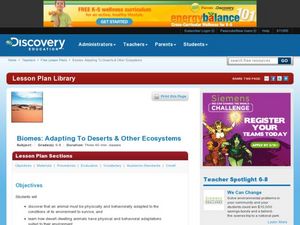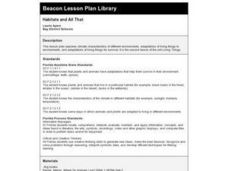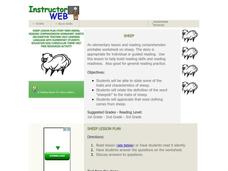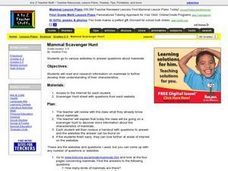Curated OER
Desert Biome
Students examine the vocabulary of desert animals and observe pictures of the animals as they name them. As a class, students compare and contrast the characteristics of desert animals. Using a specified website, students match...
Curated OER
Biomes: Adapting To Deserts & Other Ecosystems
Middle schoolers examine how animals must be adapted to the conditions of its environment to survive. In this biomes lesson students research desert adaptations then discuss how these animals have survived.
Curated OER
Habits: An Introduction
Second graders identify different types of habitats animals live in to have a better understanding of the world around them. They choose a habitat, draw a picture of an animal that lives there and list the unique attributes the habitat...
Curated OER
Diversity And Adaptations Of Organisms
Eighth graders study how and why animals are classified into eight groups in the animal kingdom. They work together to identify organisms. They use the key to determine the phylum for the included problems.
Curated OER
Understanding Science Vocabulary And Categorization
Learners explore and examine scientific language and categorization as related to commonly known plants and animals. They hypothesize about a specific plant or animal, how it was scientifically named, what concepts and vocabulary is...
Curated OER
Baleen Whales vs. Toothed Whales
Second graders review mammal characteristics and study two types of whales. In this mammal study lesson, 2nd graders discuss mammals and define their five characteristics. Students complete a whale worksheet and define differences...
Curated OER
Habitats and All That
First graders read books, complete online explorations and discuss the ways in which animals adapt to their habitats in order to survive. They create accordion books, play matching games and dramatize animal adaptations.
Curated OER
Living vs. Non-Living Things
Fourth graders describe the characteristics that determine if something is living, dead, or non-living. They determine the difference between living and non-living things. Students determine if an object is living or non-living and...
Curated OER
Pio, Pio, Que Frio
Students investigate the characteristics of living things. They determine that different organisms have different needs and describe and compare them. They draw and verbally respond about their favorite animal.
Curated OER
What is an Animal?
In this animal classification worksheet, students will review the characteristics used in classifying animals including the development of animals. Students will compare the endoderm, ectoderm, and mesoderm. This worksheet has 4 short...
Curated OER
One of These Things is Not Like the Other
Students examine sets of four or five organisms and determine which organism in each set doesn't "belong", and determine a variety of characteristics that explain why it doesn't belong.
Curated OER
We're Batty
Students watch a video about bats and compare and contrast them to birds. They identify the specific characteristics that identify bats as mammals and what makes them unique from other mammals.
Curated OER
Cells
Students research both plant and animal cell characteristics. They draw the parts of each cell and as groups present their research.
Curated OER
Animal Games
Students explore a variety of games on the Internet that will teach them about animals; they focus on the Florida panther. Students choose the activity that is of interest to them, and then rotate between the games online and the games...
Curated OER
Now Hear This!
Students observe the differences between low- and high-frequency sounds. They research and compare the characteristics of various animals that rely on infrasonic sounds to communicate.
Curated OER
Sheep
Students practice their reading comprehension by reading about sheep. They describe the characteristics of the animal and discover what type of clothing comes from them.
Curated OER
Explore the Arctic: A Scavenger Hunt
Students explore the Arctic region using the internet. They identify characteristics of animals that live in the Arctic and locate the Arctic region using a map of the United States.
Curated OER
A Day in a Life of an Arctic/Antarctic Animal
Students, through video segments, explore what types of animals live in the Arctic and Antarctica. They also clear up any misconceptions they have about penguins or polar bears.
Curated OER
Animal Classification
Students recognize the six groups of animals (Mammals, fish, birds, reptiles, amphibians and arthropods) and their characteristics. In this animal characteristics lesson, students sort animals by their traits. Students cut and paste...
Curated OER
What Animal Am I?
Students brainstorm different characteristics of invertebrates and investigate invertebrates by conducting Internet research.
Curated OER
Mammal Scavenger Hunt
Students use the internet to answer their questions about mammals. They complete a scavenger hunt worksheet to identify their characteristics. They ask any questions they have at the end of the lesson.
Curated OER
Honey Bee Biology
Students review the basic parts of an insect and explore the anatomical characteristics of a honey bee. The second part of the instructional activity focuses on ways to identify a honey bee from other stinging insects.
Curated OER
Life in Sahara
Students explore the geography of the Sahara region of Africa and identify characteristics of a desert habitat. They explore the culture of the people living there and how it has adapted to desert life.
Curated OER
Everything in Its Place: Science Classification
Students investigate the system of classification for living things through the sixteen lessons of this unit. The five kingdoms of monerans, protists, fungi, plants, and animals form the basis of several experiments as the similarities...

























